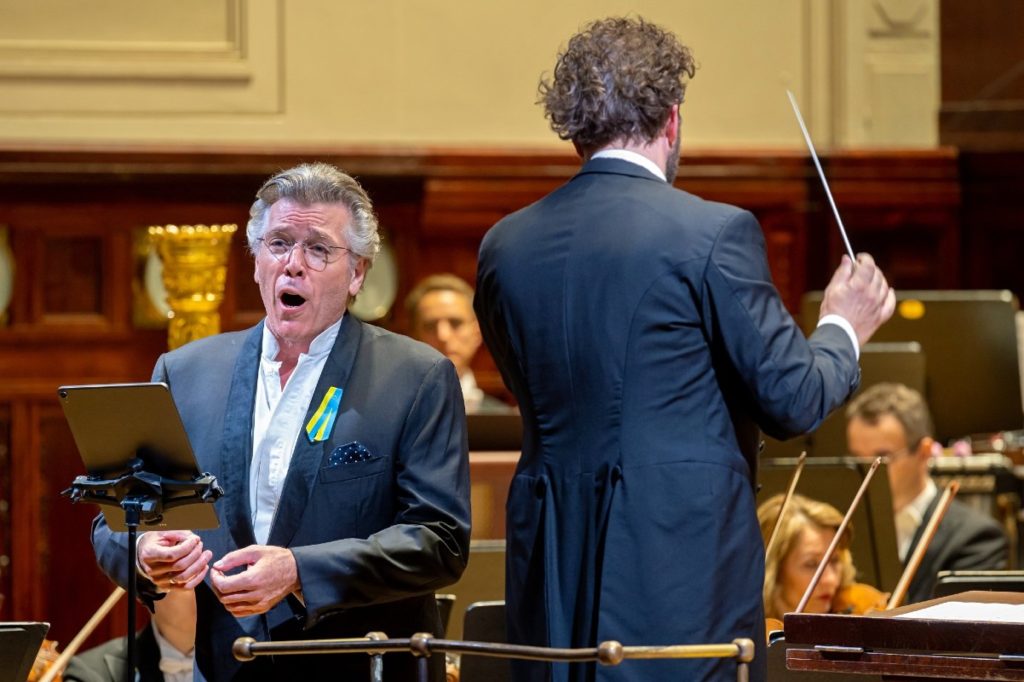Thomas Hampson enchanted Prague again

Photo: Petr Dyrc
As part of the subscription concerts of the Prague Symphony Orchestra The famous American baritone Thomas Hampson performed twice in Prague. He sang a song cycle by our renowned composer Sylvia Bodorová Lingua angelorum, written specifically for this performer.
The almost one-hour cycle with orchestral accompaniment was created in 2012. The program for the concert quotes the composer herself, who said about the origin of this work: “We walked through winter Prague together and reached Prague Castle. We realized that just in a year (in January 2012) it will be 400 years since Rudolf II. he died. And the idea was in the world – to write an orchestral cycle inspired by Rudolfinian Prague. I have to say that I was thrilled by the idea. ” The whole series consists of eight songs, which are written in nine different lyrics – in Italian, Latin, Ottoman, Spanish, English, Yiddish, Hebrew, Czech and German. Thomas Hampson (now a 66-year-old singer) impressed with his first tone – high e sung and foam foam– in the first song Il mio martir (My Suffering) . Yes, if he can sing and his career is reasonably built, when the singer does not sing outside his vocal field and builds his career with the idea that he will not end at the age of thirty-five, then he sings at this age as well. Thomas Hampson’s speech, whose full-length song recital with songs by Gustav Mahler many years ago in Prague’s Žofín is still remembered by many listeners, still shows his honest approach to art and singing, perfect control of singing technique and a deep immersion into the interpreted work. Thomas Hampson is one of the greatest singers of the 20th and 21st centuries. He never limited his repertoire to his favorite operas, let’s at least recall his performance in Miroslav Srnka’s opera The South Pole at the Bavarian State Opera in Munich in 2016.
Sylvia Bodorová ‘s cycle of Lingua angelorum songs is written very effectively, but not superficially. He respects the singer, whose part is part of the whole score, which is written for large orchestra, while the orchestra never covers the singer (at least he did not cover Thomas Hampson) – similar to the orchestral songs of Richard Strauss, which also accompanies the large orchestra. However, Strauss, whose mistress was an opera singer, understood the singing and knew in which position the voice sounded and what instrumentation he could afford. In the same way, Sylvie Bodorová understands the human voice and, given the sound of the human voice, instruments her songs. The lyrics of the individual songs are already very contrasting in their content and are just set to music. So we hear, for example, Turkish Janissary music (a kind of response from MozartKidnapping from a series?) With the use of a number of percussion instruments, in addition to a love song to the words of Giovanni Guarini or a touching lullaby. The whole cycle then culminates in a relatively extensive epilogue by O, Ewigkeit, du Donnerwort to a text by Johann Rist. It would seem that writing a song cycle is relatively simple, it is definitely more realized than an oratorio or an opera (after all, Sylvie Bodorová’s opera Quo vadis was now performed by the DJKT opera in Pilsen). However, the Lingua angelorum cycle is relatively demanding for both singers and orchestras, and it is good that it created and enriched Czech song literature. Sylvie Bodorová can write for the human voice and we will certainly welcome her other songs in the future.